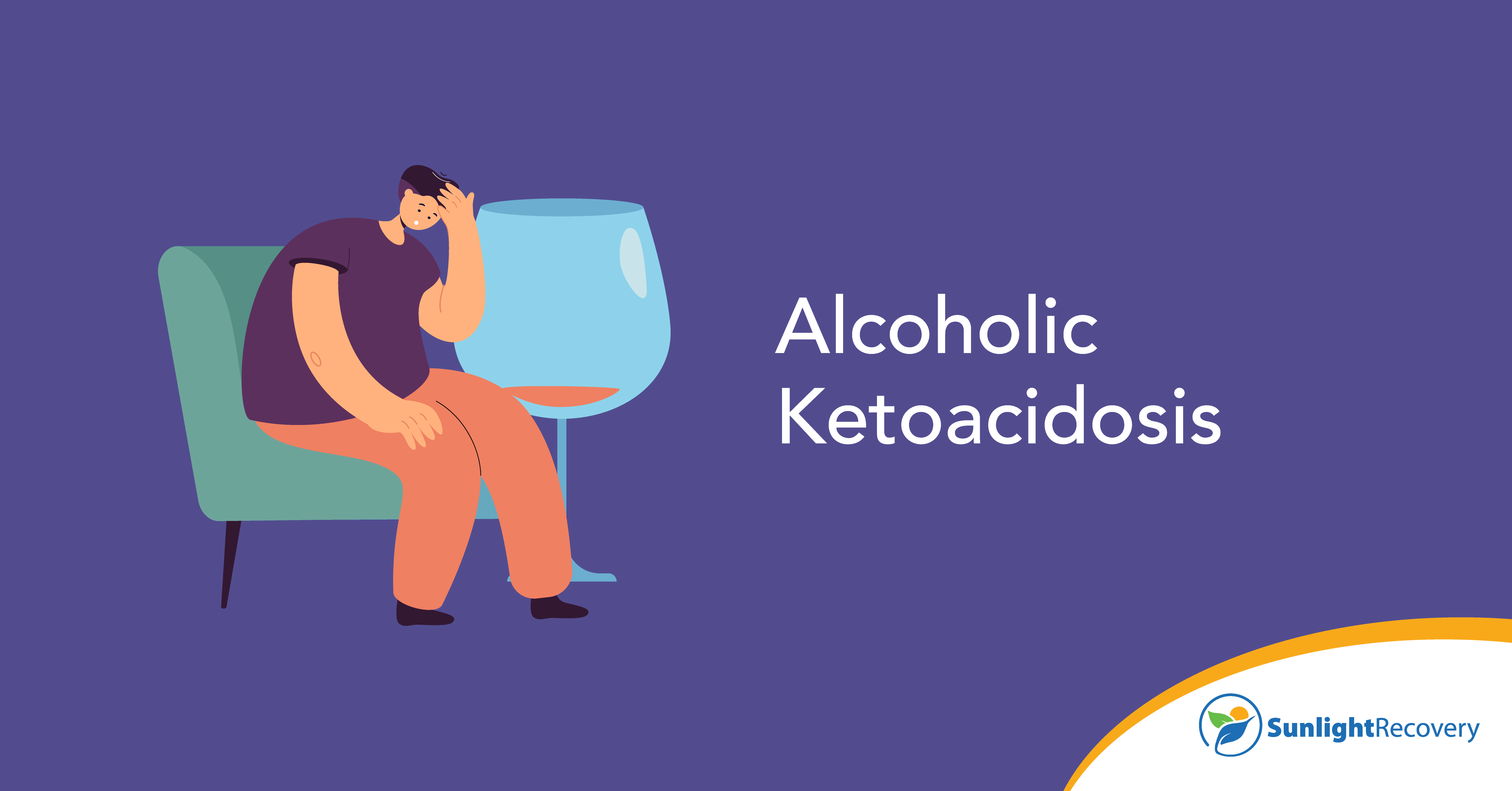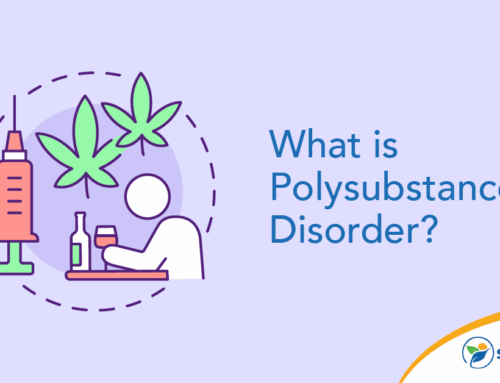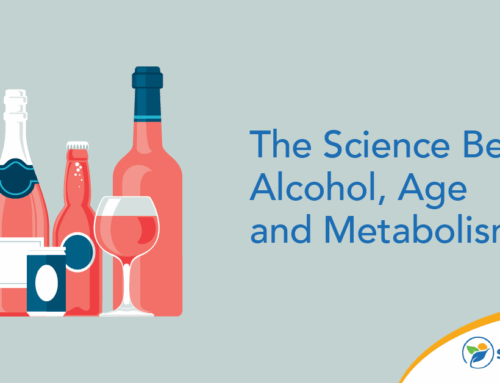Do you feel particularly awful after a night of heavy drinking? That’s not entirely surprising as alcohol is a toxin that harms physical and mental health when ingested in large quantities. Some people experience much more severe symptoms after a heavy drinking session, however. Alcoholic acidosis (also known as alcoholic ketoacidosis) is a serious condition most commonly seen in people who are frequent heavy drinkers. If you regularly consume significant quantities of alcohol, it can be helpful to know what alcoholic ketoacidosis is, so you can watch for the warning signs.
What Is Alcoholic Acidosis?
Alcoholic acidosis is a group of symptoms that occur due to alcohol abuse and typically present themselves after a binge-drinking episode. This condition is most commonly seen in those living with alcohol abuse disorder.
People often show symptoms of alcohol ketoacidosis if they:
- Have just finished a binge-drinking episode
- Are dehydrated
- Stopped eating for 1 to 3 days
- Have co-occurring liver disease or liver damage
These conditions cause a build-up of harmful substances known as ketones, which can make a person’s blood dangerously acidic and potentially damage their organs. People who drink heavily might already have an excessive buildup of ketones in their bodies. This can quickly become a problem because ketones are highly acidic, and an oversupply makes the blood dangerously acidic.
What Causes Alcoholic Ketoacidosis?
When most people think of ketoacidosis, they think of the issue experienced by diabetics, where a lack of insulin causes ketones to build up in the bloodstream. Alcoholic ketoacidosis is similar, but rather than a lack of insulin causing the level of ketones to spike, it’s a lack of glucose.
An alcoholic ketoacidosis episode causes the body to produce ketones in response to a lack of nutrition. Ketones are acidic chemicals the body produces and uses as an energy source when there’s a lack of glucose. Alcohol prevents the body from making glucose; therefore, drinking increases the natural production of ketones. When a person experiences this increased level of ketones and doesn’t eat for a few days (therefore not replenishing blood glucose levels), the body is flooded with ketones.
Alcoholic ketoacidosis is most commonly seen in people who are heavy drinkers, especially if they become dehydrated and malnourished. This can occur due to dehydration from drinking, low glucose levels from not eating, vomiting after binge drinking and a buildup of ketones in the body from frequent drinking.
Not every person who drinks will experience alcoholic ketoacidosis, and there are no exact figures on the condition’s prevalence. Still, individuals who drink heavily are at a greater risk of developing the condition. The illness doesn’t discriminate and affects all genders and races. It’s most common in people aged 20-60.
The Symptoms of Alcoholic Ketoacidosis
The main symptoms of alcohol-induced ketoacidosis are:
- Nausea
- Vomiting
- Abdominal pain
- Diarrhea
- Confusion and an altered mental state
- Agitation
- Fatigue
- Labored breathing
- Low blood pressure
- Loss of appetite
- Lightheadedness
- Rapid heartbeat
- Coma
- Cardiac arrhythmia
An individual may experience just one or several of these symptoms as alcoholic ketoacidosis sets in. If left untreated, the condition can progress until the symptoms become life-threatening.
Many symptoms associated with alcoholic ketoacidosis are also common side effects of other medical conditions. Conditions that may present similarly to alcoholic ketoacidosis or in conjunction with it include:
- Pancreatitis
- Alcohol withdrawal
- Peptic ulcer disease
- Inflammation of the gallbladder
- Acute mesenteric ischemia, which is characterized by sudden, severe abdominal pain
If you or someone you love displays these symptoms, consult a medical professional as quickly as possible. You can’t be sure what the underlying cause is, and many of these conditions require immediate medical attention.
Exams and Tests for Alcoholic Ketoacidosis
Tests for alcoholic ketoacidosis include:
- Arterial blood gas tests (to measure the acid/base balance of the patient’s blood)
- Blood alcohol tests
- Liver function tests
- Urine ketone tests
- Complete blood count
- Prothrombin time (to measure blood clotting time, an indicator of liver health)
These tests can help determine if a person has ketoacidosis and pinpoint the underlying cause. They can also determine whether the patient has impaired liver function, which often occurs with alcoholic ketoacidosis.
What’s the Prognosis for Alcohol-Induced Ketoacidosis?
Alcoholic ketoacidosis that isn’t treated immediately can progress and lead to life-threatening symptoms. Potential complications include:
- Heart issues, including irregular heartbeat and heart attack
- Liver disease
- Gastrointestinal bleeding
- Pancreatitis
- Seizures
- Alcohol withdrawal symptoms, such as shaking, shivering, sweating and confusion
- Pulmonary edema
- Kidney failure
- Death
However, someone with alcoholic ketoacidosis who receives prompt treatment may recover without long-term side effects. The health risks associated with alcoholic ketoacidosis mainly come from continued heavy drinking and the potential conditions that can be related to that behavior, such as pancreatitis, cancers and organ damage.
Treatment Options for Alcoholic Ketoacidosis
Treating alcoholic ketoacidosis involves short-term and long-term care. The short-term focus is on dealing with the immediate symptoms and stopping the excess acid from causing further damage. Treatment may include administering IV fluids to address dehydration and vitamin supplements, such as thiamine, to treat malnutrition.
Ultimately, the long-term solution is for the individual suffering from alcoholic acidosis to address their drinking problem. A national study conducted in 2023 found that almost 28.9% of Americans aged 12 or older had (or were currently living with) alcohol use disorder in the year leading up to the study.
Alcoholism affects people from all walks of life and can have serious consequences if not treated. Many who live with alcohol use disorder fall into the category of high-functioning alcoholics. While these individuals may drink more than the recommended maximum each day or week, they still hold steady jobs and appear to lead normal lives. It’s easy for such individuals to deny they have an issue with their alcohol consumption. However, frequent heavy drinking over a long period can cause significant hidden damage to the body.
Individuals can treat their drinking problem with medication, therapy or a combination of the two, as well as other treatment methodologies. Ultimately, therapy is the best tool for the majority of people because it can help them understand why they drink, identify their triggers and learn to avoid or resist future temptation.
Alcoholic Ketoacidosis Prevention
If you’re concerned you might be prone to alcoholic ketoacidosis, consider taking steps to reduce or eliminate your drinking as soon as possible. If the idea of cutting down on drinking seems impossible to you, it’s probably time to seek help. Remember that addiction is a medical condition and there’s no shame in seeking professional support to beat it. You don’t need to put yourself at risk of illnesses such as alcoholic acidosis. Take action now to avoid serious health problems in the future.
Alcohol Disorder Treatment at Sunlight Recovery
You no longer have to live in fear of developing conditions such as alcoholic ketoacidosis. Sunlight Recovery is Florida’s top detox and residential substance abuse treatment provider in Florida. If you’re ready to combat your drinking and take back control of your life, let Sunlight Recovery help you. Contact us today to find out which of our programs best fits your needs.







